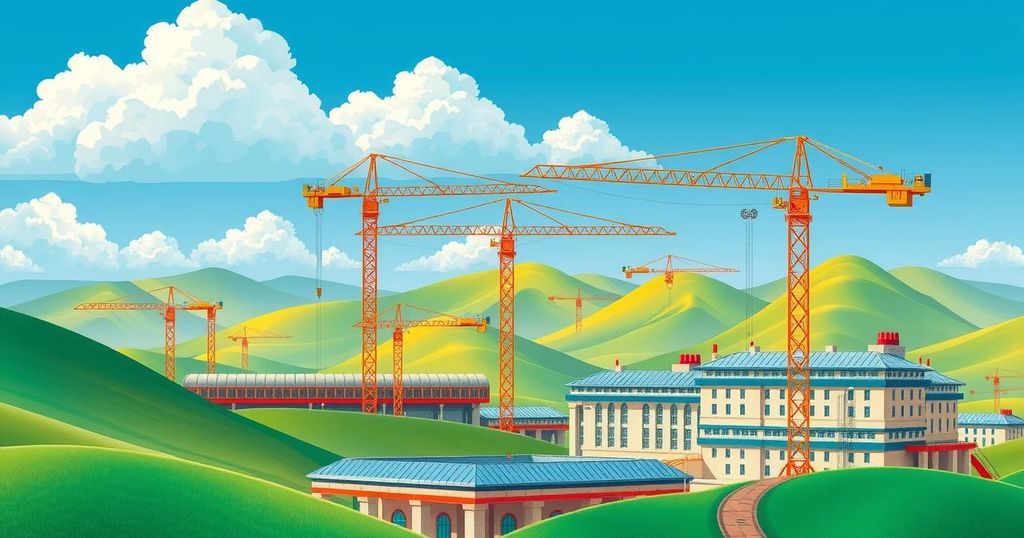Mongolia’s Strategic Megaprojects to Boost Economic Development

Mongolia is advancing several megaprojects to enhance its economy by processing raw materials domestically rather than solely exporting them. The government has proposed 14 major projects, and initial agreements have been established with foreign investors. Challenges remain, especially regarding sustainability and public acceptance, yet officials believe these initiatives are essential for economic growth.
Mongolia is embarking on ambitious megaprojects aimed at expanding its industrial economy, particularly through the processing of its rich raw materials. Currently, the mining sector has been a significant contributor to the economy for nearly two decades, largely exporting coal and copper to China. However, politicians are advocating for increased domestic processing to retain value within the nation.
Plans have been initiated to enhance Mongolia’s industrial capacity by establishing new factories and infrastructure, responding to public demand for improved economic opportunities. Deputy Speaker of the Ikh Khural, Bulgantuya Khurelbaatar, emphasizes the need for substantial projects, stating, “People are much more keen to see results. They also want to see their livelihoods being uplifted significantly.” The goal is to stimulate the economy, potentially transforming raw minerals into valuable finished products for global markets.
The Prime Minister, Oyun-Erdene Luvsannamsrai, has identified 14 key megaprojects, including mineral processing centers and energy facilities. Significant progress has already been made with agreements to develop a uranium mine in Dornogovi and a cross-border rail link with China. Both projects are seen as critical for future expansions in the mining industry and energy independence from neighboring countries.
Despite the ambitious plans, the government faces various challenges, including the necessity for billions in foreign investments and concerns over sustainability. Rapid development threatens Mongolia’s natural beauty and traditional nomadic culture, requiring careful management of resources like water to ensure their preservation alongside industrial growth.
Mongolia’s government, in collaboration with political parties, seeks to promote these projects urgently in its 2024-2028 action plan. Forming a coalition has facilitated progress on contentious projects, such as the uranium deal and water diversion initiatives. Furthermore, the administration is dedicated to protecting traditional lifestyles amidst the planned infrastructure development.
The financing for these megaprojects, which could amount to billions of dollars, is to be acquired from private entities and foreign investors, minimizing taxpayer risks. Successful partnerships are already in place, with notable foreign investment commitments for the uranium mine and hydropower projects. Mongolia aims to signal its commitment to stable foreign investment following previous challenges with international corporations.
However, public sentiment towards these megaprojects is mixed, with some politicians and citizens voicing concerns about dependency on mining and the potential strain on national debt. They fear that these initiatives could exacerbate economic vulnerabilities rather than support sustainable growth. Nonetheless, officials remain steadfast, citing the importance of these ventures for attracting both domestic and international investments.
In conclusion, Mongolia’s strategy to invest in megaprojects aims to elevate its economic standing and retain the value of its natural resources through domestic processing. While substantial progress is being made, challenges such as sustainability concerns and public skepticism persist. The government’s commitment to fostering foreign investment and tackling political barriers will be crucial in transforming the nation into a significant player in global supply chains. However, careful management of resources and public concerns about the balance of development will play a critical role in the success of these initiatives.
Original Source: www.bne.eu








